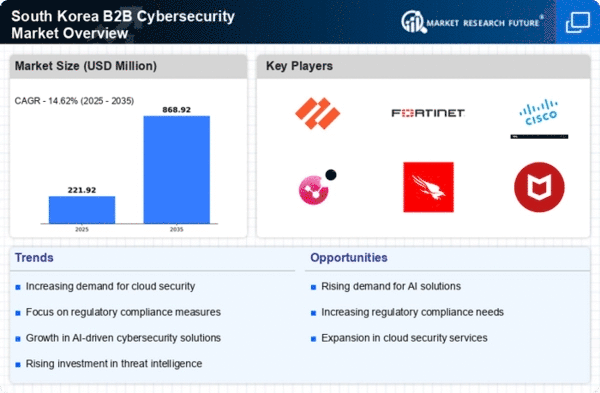Rising Cyber Threat Landscape
the B2B cybersecurity market in South Korea is experiencing increased demand for security solutions due to an increasingly complex cyber threat landscape. Cyberattacks, including ransomware and phishing, have surged, prompting businesses to invest in robust cybersecurity measures. In 2025, it is estimated that cybercrime could cost the global economy over $10 trillion annually, with South Korea being a significant target due to its advanced technological infrastructure. This alarming trend compels organizations to prioritize cybersecurity, leading to a projected growth rate of 12% in the b2b cybersecurity market. Companies are now more aware of the potential financial and reputational damage caused by breaches, driving them to seek comprehensive solutions to safeguard their assets.
Growing Awareness of Data Privacy
In South Korea, the growing awareness of data privacy issues is significantly influencing the b2b cybersecurity market. With the implementation of stringent data protection regulations, such as the Personal Information Protection Act (PIPA), businesses are compelled to adopt comprehensive cybersecurity measures to ensure compliance. Failure to adhere to these regulations can result in hefty fines, reaching up to 3% of annual revenue. Consequently, organizations are increasingly investing in cybersecurity solutions to protect sensitive data and maintain customer trust. This trend is expected to drive the b2b cybersecurity market, with a projected growth of 15% in the next few years as companies prioritize data protection and privacy.
Emergence of Advanced Technologies
The emergence of advanced technologies, such as artificial intelligence (AI) and machine learning (ML), is reshaping the b2b cybersecurity market in South Korea. These technologies offer innovative solutions for threat detection and response, enabling organizations to proactively address potential security breaches. In 2025, it is projected that AI-driven cybersecurity solutions will account for over 30% of the market share, reflecting a growing reliance on automation to enhance security measures. As businesses recognize the potential of these technologies to improve efficiency and reduce response times, investment in AI and ML-based cybersecurity solutions is expected to rise. This trend indicates a transformative shift in how organizations approach cybersecurity, driving growth in the b2b cybersecurity market.
Government Initiatives and Support
the South Korean government plays a pivotal role in shaping the cybersecurity landscape through various initiatives and support programs. In recent years, the government has launched several cybersecurity frameworks aimed at enhancing national security and protecting critical infrastructure. For instance, the Cybersecurity Strategy 2025 aims to allocate approximately $1 billion to bolster cybersecurity capabilities across industries. This proactive approach not only fosters a secure environment for businesses but also encourages investment in cybersecurity solutions. As a result, the b2b cybersecurity market is likely to benefit from increased funding and resources, facilitating the development of innovative technologies and services.
Digital Transformation and Cloud Adoption
the ongoing digital transformation across various sectors in South Korea is a key driver for cybersecurity solutions. As businesses increasingly migrate to cloud-based solutions, the demand for cybersecurity measures tailored to protect these environments is surging. In 2025, it is anticipated that cloud adoption in South Korea will reach 80%, necessitating advanced security protocols to mitigate risks associated with cloud computing. This shift not only enhances operational efficiency but also exposes organizations to new vulnerabilities, prompting them to invest in specialized cybersecurity solutions. The b2b cybersecurity market is likely to expand as companies seek to secure their digital assets in an evolving technological landscape.
















